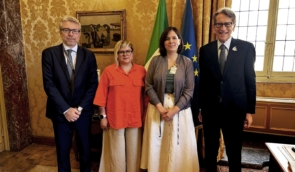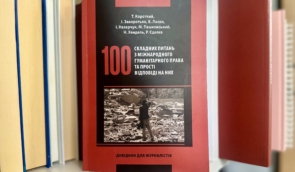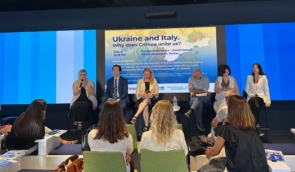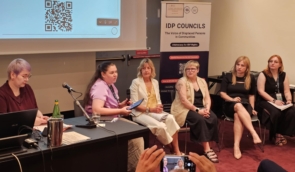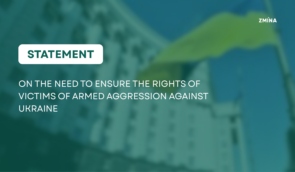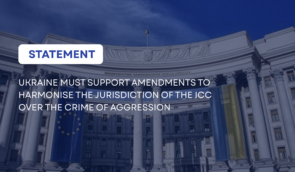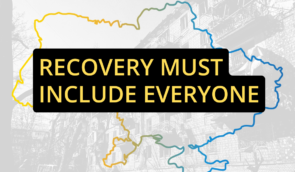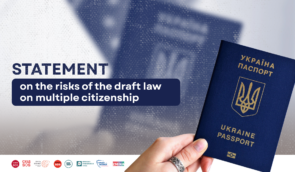Ukraine: condemning the systematic mistreatment of those held by the Russian Federation
Freedom House continues to unambiguously condemn the Russian Federation’s illegal and ongoing full-scale war against Ukraine and its occupation of Ukrainian territories. We firmly stand with Ukraine and its allies in stating that Russia has no legitimate claim to the sovereign Ukrainian territory of Donetsk, Kherson, Luhansk, Zaporizhzhia regions, and Crimea. We condemn, in the strongest terms possible, Russia’s repressive policies to exercise control over Ukrainian territory and suppress Ukrainian culture and identity.
Today, we sound the alarm over the systemic ill treatment, torture, and lack of access to Ukrainians held by the Russian Federation. We urge a more robust international response to the growing number of Ukrainian political prisoners, civilians who have been forcibly disappeared, and prisoners of war (POWs) held by the Russian Federation in the temporarily occupied territories of Ukraine or on the territory of the Russian Federation.
First, on Ukrainian political prisoners held by Russian authorities in Ukraine’s temporarily occupied territories or moved to the Russian Federation, we emphatically state that they must all be immediately and unconditionally released. We consistently hear from Ukrainian partners that Russian prison authorities refuse to provide urgent medical treatment to detained Ukrainians, and that abuse and neglect are commonplace. We call attention to the deaths of two Crimean Tatar political prisoners – Dzhemil Gafarov and Kostiantyn Shyrinh – who both had untreated medical conditions and reportedly were refused medical attention while in Russian custody. The Ukrainian organization, ZMINA Human Rights Centre, estimates that there are at least 45 other political prisoners who have been denied urgent care by the Russian authorities. In addition to denial of medical care, Freedom House is also concerned by the Russian authorities’ tactic of transferring Ukrainian political prisoners to prisons deep within Russian territory, which significantly impedes the prisoners’ right and access to lawyers and family visitation.
Freedom House emphasizes the ongoing political persecution and imprisonment of Crimean Tatars by occupying Russian authorities. According to Crimean Solidarity, there are 186 political prisoners from Crimea, of whom 116 are Crimean Tatar, as of September 27, 2023. Many of them are independent journalists. One case to highlight is that of Server Mustafayev, a prominent human rights defender and co-founder of Crimean Solidarity, an organization that defends victims of political persecution in Crimea. Like many Crimean Tatars, he was charged with being a member of the nonviolent Islamist movement Hizb ut-Tahrir, which Russia has designated a terrorist group, but which operates legally in Ukraine and many other countries. He was arrested in May 2018 and eventually sentenced to 14 years in a high-security forced labor camp. Mustafayev’s unjust detention is a telling example of the Kremlin’s religious and political repression under the pretense of “fighting terrorism.” We cannot stand for such an egregious violation of human rights.
Second, Freedom House is concerned by credible reports that Russia is forcibly disappearing civilians in Ukraine’s occupied territories. These claims warrant far more international outcry. Civilians typically targeted include public activists, human rights defenders, volunteers, journalists, local politicians, educators, former police officers, veterans, and religious figures. Freedom House’s partner, ZMINA Human Rights Center, refers to this practice as “a policy of suppressing the resistance of the local population in occupied territories.” We wholeheartedly echo their assessment. Russia often holds these civilian prisoners incommunicado without status under Russian law or access to lawyers. The exact figures are unknown, but the Ukrainian government estimates that Russia is holding close to ten thousand civilians in 125 makeshift detention centers across occupied Ukraine, as well as 37 more in Russia and Belarus. Torture and summary executions are commonplace. We implore democratic governments to bring international attention to what the Associated Press has referred to as “invisible prisoners” and bring their Russian captors to justice. We also condemn the Russian Federation’s ongoing denial of holding these civilians captive.
Third, we are deeply concerned about the treatment of Ukrainian prisoners of war (POWs), specifically Russia’s practice of criminalizing POWs through bogus accusations and then preventing their right to legal counsel and a fair trial with credible evidence. They are often denied access to lawyers during the pre-trial detention stage, which is where POWs experience the most severe treatment, torture, and are often forced by interrogators to give false confessions. POWs are also frequently denied medical care, and Russia routinely refuses to disclose their location to family members. Freedom House unequivocally condemns this extralegal regime and the fabrication of bogus charges against Ukrainian POWs. We also condemn the fact that the Russian authorities consistently impede the access of the International Committee of the Red Cross (ICRC) to Ukrainian POWs despite repeated demands as a clear violation of international humanitarian law. We also reiterate our condemnation of Maksym Butkevych’s unjust treatment and recent sentencing to 13 years’ imprisonment. We demand his immediate release. The systematic mistreatment of those held captive by Russian occupying authorities in Ukraine necessitates further international outcry and condemnation. Freedom House asks OSCE participating States and OSCE institutions to shine further light on these human rights abuses and pursue justice for the victims. In addition, we urge the following actions.
Freedom House calls on Ukrainian authorities to:
- Ensure that the Coordination Headquarters for the Treatment of POWs has adequate resources to properly investigate, search for, and provide legal assistance to civilian prisoners who must be released.
- Ensure adequate coordination between civil society and government authorities to continue information sharing and evidence collection on POWs and civilian prisoners, ensuring that their names are on prisoner exchange lists.
- Continue prioritizing the collection of evidence of Russia’s alleged war crimes as Ukraine liberates territory held by Russian forces.
Freedom House calls on the Russian Federation to:
- Grant the OHCHR unimpeded and confidential access to official places of detention and detainees
- Guarantee Ukrainian detainees’ right to information, and their right to read, write, send, and receive letters, as well as make and receive phone calls.
- Fulfill its obligations under the 3rd Geneva Conventions and establish a National Information Bureau (NIB) to collect information on Ukrainian POWs, as well as on both POWs and civilians who have been killed or are missing or detained.
Freedom House calls on OSCE participating States and OSCE institutions to:
- Provide financial support to grassroots civil society organizations that work with the families of political prisoners, civilian prisoners, and POWs. These organizations have the capacity to advocate for families and then meaningfully engage with state authorities on this issue.
- Provide technical and financial assistance to human rights groups and initiatives monitoring, searching for, and providing legal assistance to Ukrainian citizens held in captivity or deported by the Russian Federation.
- Increase pressure on the Russian Federation to allow a proper international investigation into the Olenivka prison massacre on July 29, 2022, which killed at least 50 Ukrainian POWs. Russian occupying authorities should provide access to the area and safety assurances to UN investigators.
- Demand that the UN Human Rights Council expands the mandate of the Special Rapporteur on human rights in Belarus and the Russian Federation to include monitoring the presence of Ukrainian POWs and arbitrarily detained civilians on the territory of the Republic of Belarus and the Russian Federation
- Provide support (including psychosocial, legal, and humanitarian assistance) for the families of those detained or kidnapped, and for the rehabilitation and reintegration of those released from captivity.
- Continue to provide technical and financial assistance to the Ukrainian government and civil society in the documentation of war crimes.
- Continue to provide technical and financial assistance to activists, journalists, and human rights lawyers in Crimea so that they can continue their critical work in monitoring and raising awareness regarding the cases of political prisoners.
- Increase international advocacy efforts calling attention to the detained, kidnapped, and missing people in occupied Ukrainian territories. We urge the international community to increase pressure on the Russian Federation to release those unjustly detained.
- Maintain, strengthen, and coordinate with allies on sanctions against the occupying authorities in Crimea and newly occupied regions, as well as those in the Kremlin responsible for the invasion of Ukraine.
Source: Freedom House
If you have found a spelling error, please, notify us by selecting that text and pressing Ctrl+Enter.

